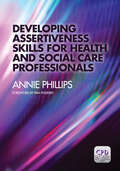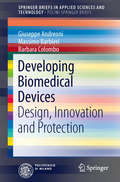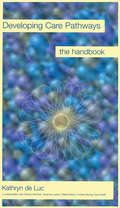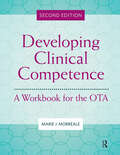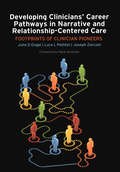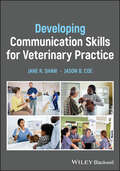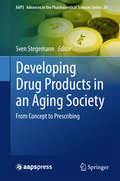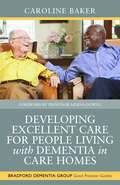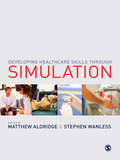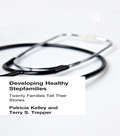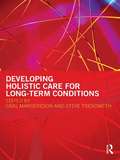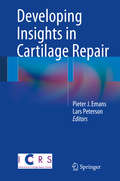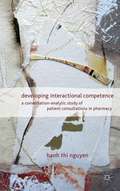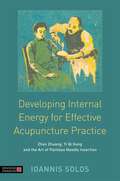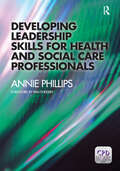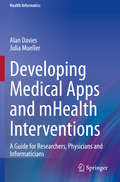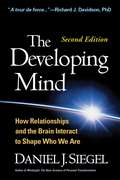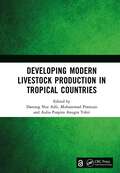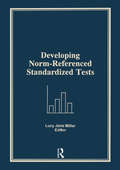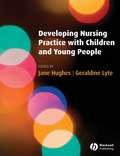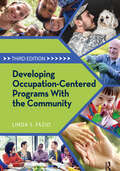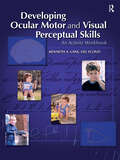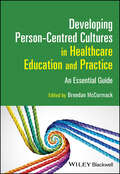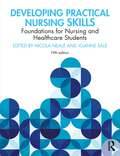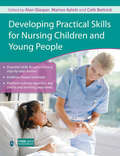- Table View
- List View
Developing Assertiveness Skills for Health and Social Care Professionals
by Annie PhillipsWant to communicate clearly, honestly and directly, without avoidance or resorting to manipulative or aggressive behaviour? Learn how to be assertive and explore its advantages as the primary tool of effective communication skills in healthcare settings. If you work in health or social care as a manager or clinician, deal with people on a daily basis, and need these dealings to be thoughtful, effective and stress free, this is the book for you. It teaches you how to understand and alleviate barriers to effective communication, manage the stresses and conflicts, and develop the effective clinical, people and management skills you need to navigate successfully through a career in healthcare. It challenges the reader to re-construct their approach to communication and present themselves more confidently whilst encouraging investment in their personal and professional development. This highly practical guide, and its companion volume Developing Leadership Skills for Health and Social Care Professionals are essential tools for all health and social care professionals wanting to develop relationships with their colleagues, patients and clients including clinicians, practice managers, nurses, midwives, general practitioners, therapists, doctors, dieticians, psychological therapists, paramedics and health visitors.
Developing Biomedical Devices
by Giuseppe Andreoni Massimo Barbieri Barbara ColomboDuring the past two decades incredible progress has been achieved in the instruments and devices used in the biomedical field. This progress stems from continuous scientific research that has taken advantage of many findings and advances in technology made available by universities and industry. Innovation is the key word and in this context legal protection and intellectual property rights (IPR) are of crucial importance. This book provides students and practitioners with the fundamentals for designing biomedical devices and explains basic design principles. Furthermore, as an aid to the development of devices and products for healthcare, it presents a brief description of the human body, covering anatomy and physiology, that will assist the reader in understanding the origin of biosignals, their significance and the technology to be used in their measurement. Issues concerning IPR and protections are also fully discussed, with examples and opportunities for IPR exploitation.
Developing Care Pathways: The Handbook
by Kathryn de LucThe relationship between poverty and child health has always been assumed but this book demonstrates how the evidence of history and of other societies establishes a causal link. The practical implications in health and social policy are presented in the context of child care services, together with some innovative approaches to future development. This is a book for professionals in medicine, nursing and the social services who are involved in research and the practical issues of delivering a modern health care service to disadvantaged children.
Developing Clinical Competence: A Workbook for the OTA
by Marie MorrealeA newly updated, user-friendly resource for occupational therapy assistant students and new practitioners, Developing Clinical Competence: A Workbook for the OTA, Second Edition assists readers in developing practical problem-solving and “‘real-life”’ skills essential for fieldwork and clinical practice. Maintaining the easy-to-read workbook format from the First Edition, this book is filled with learning activities, worksheets, and detailed answer explanations, as well as expanded chapter content and revised references.Marie J. Morreale breaks down competencies into step-by-step units to allow for independent study. With multiple choice, matching, true/false, and fill-in-the-blanks questions; case studies; vignettes; and experiential activities, this Second Edition presents helpful tips in their most useful format. Guiding the reader through occupational therapy clinical decision making, professional conduct, and meeting standards of care for various practice areas, each chapter is fully independent and can be read in the order most conducive to the reader’s individual learning needs. This text can help readers measure attainment of knowledge and skills when preparing for fieldwork, the national certification exam, or transitioning to entry-level practice.New for the Second Edition: Fundamental topics including effective communication, assessment of client function, safety, supervision, documentation, group process, and department management Additional questions regarding behavioral health and pediatric practice Expanded content for professionalism, ethics, cultural sensitivity, and interventions to support occupations Topics such as wheeled mobility, hand function development, infection control, feeding/eating, wound care basics, quality improvement, and more Added content regarding the American Occupational Therapy Association documents, evidence-informed practice, advocacy, chronic conditions, and new trends Incorporated concepts and principles from the Occupational Therapy Practice Framework: Domain and Process, Fourth Edition Included with the text are online supplemental materials for faculty use in the classroom. Addressing fundamental areas of occupational therapy practice for a wide variety of conditions, situations, and practice settings, Developing Clinical Competence: A Workbook for the OTA, Second Edition includes helpful hints and practical clinical tips to help the OTA implement appropriate interventions and communicate more effectively.
Developing Clinicians' Career Pathways in Narrative and Relationship-Centered Care: Footprints of Clinician Pioneers (Radcliffe Ser.)
by John D Engel Lura L Pethtel Joseph Zarconi'Today, there exists a robust body of work connecting narrative theory and practice with medical theory, practice, teaching, and research. Taken together, what is particularly interesting about these works is that they portray narrative healthcare as both a philosophy of care and a set of skills - ' John D Engel, Lura L Pethtel and Joseph Zarconi, in the Preface This inspiring collection of narrative portraits details the career paths of physicians and nurses who figure prominently in the realms of narrative and relationship-centered healthcare. Each narrative describes the healthcare practitioner's early decision process for choosing their career and follows with a trajectory of events and work situations that brought each person to their present position. They offer a unique view from both a personal and a professional perspective. The collection of narrative portraits provides students, residents, and practicing health professionals a window into the possibilities for constructing professional lives that are oriented to service in ways that are fulfilling, energizing, and creative. The editors have made an important contribution to advancing the practice of narrative and relationship-centered medicine. They invite you to listen for the truths of your own story as you hear the voices of colleagues speak from the pages in your hand. Reflecting on the ultimate concerns that move you will enable you to more fully inhabit your own life story and become more authentic and vital as you heal others. Mark L Savickas, in the Foreword
Developing Communication Skills for Veterinary Practice
by Jane R. Shaw Jason B. CoeDeveloping Communication Skills for Veterinary Practice Developing Communication Skills for Veterinary Practice provides a thorough grounding in practical communication principles for client and team interactions, and helps veterinarians and staff take their communication skills to the next level through self-development and coaching colleagues. The book describes specific evidence-based techniques, gives examples of their use, and demonstrates how to use each skill in the clinical setting, with learning activities to put into practice. It covers every mode of communication, including face-to-face, virtual, telephone, and written communication. Organized by the tasks of the clinical appointment, each chapter showcases specific communication skills. The book introduces a communication toolbox of 20 key communication skills, which can be applied to any area of veterinary practice or veterinary career path. The book: Defines each communication skill, demonstrates techniques, and provides examplesEmphasizes the importance of communicating effectively with clients and colleaguesProvides a process and structure for coaching communication with colleaguesDiscusses client and team interactions using many methods, including in-person meetings, telephone conversations, and emailsOutlines best practices for effectively communicating using technology Developing Communication Skills for Veterinary Practice is an invaluable resource for veterinary professionals at any level seeking to develop their communication skills and improve clinical outcomes.
Developing Drug Products in an Aging Society
by Sven StegemannThis book aims to address the major aspects of future drug product development and therapy for older adults, giving practical guidance for the rational product and clinical development and prescribing of drug products to this ever growing segment of the population. With authors coming from key "aging" markets such as Europe, the USA, China and Japan, the book will provide valuable information for students, scientists, regulators, practitioners, and other healthcare professionals from academia, industry and regulatory bodies.
Developing Excellent Care for People Living with Dementia in Care Homes
by Caroline Baker Pete Calveley Sue Goldsmith Jason CorriganThe award-winning PEARL (Positively Enriching and enhancing Residents' Lives) programme was developed to enable care homes to move from providing good fundamental care to excellent person-centred dementia care. Trialled extensively by one of the UK's largest care providers, it has been proven to dramatically increase the quality of life of people with dementia living in care homes, significantly reducing the use of antipsychotics and the incidence of stress-related behaviours. This concise and accessible guide, written by the Director of Dementia Care at the care provider which trialled and developed PEARL, describes the key criteria of the programme, and provides best practice guidelines for dementia care practitioners wishing to use the approach in their own care home. With an emphasis on the practical, achievable elements of the programme, and drawing on many useful examples, the author and contributors provide guidelines on, amongst many things, getting the fundamentals of person-centred care right; enabling decision-making; reducing stress-related behaviours; psychosocial treatments; safeguarding; supporting staff; and involving relatives.
Developing Healthcare Skills through Simulation
by Stephen Wanless Matthew Aldridge′This book provides an essential resource for educators of clinical skills who want to utilise simulation based education to provide optimal learning opportunities for their students.′ Andrew Bland, University of Huddersfield ′In this book, a team of experienced authors have put together a much needed text that takes an evidence-based, practical approach to skills development.′ Lauren Mawson, University of Cumbria ′A really exciting new text.′ Sarah Burden, Leeds Metropolitan University Practice educators and mentors are now expected to have the skills and techniques needed to implement a ′learning skills through simulation′ programme into established curricula, yet using simulation to teach - while of huge importance - requires careful and time-consuming planning. This valuable resource takes away some of that burden by providing clear, ready-made activities and guidance from leading practitioners in a range of fields, which healthcare and practice educators and mentors can use to enhance their teaching of all the essential and commonly-taught clinical and management skills and knowledge. Dedicated chapters, which all follow a defined step-by-step format, provide simulation scenarios, alongside facilitator guidance, which will help develop confidence in the teaching of key skills such as: - Drug administration - Conflict management - Infection control - Breaking bad news - Catheter and bowel care These scenarios and accompanying guidance can be used as a framework for teaching, promoting a greater understanding of the skill being taught, and providing a risk-free opportunity for the student to practice their clinical and managerial skills and judgement.
Developing Healthy Stepfamilies: Twenty Families Tell Their Stories
by Patricia Kelley Terry S TrepperView the inner workings of healthy stepfamilies through the stories of twenty families as they discuss how their households operate. This enlightening book takes a deeper look at what adults and children in stepfamilies say about such issues as discipline, money, family roles and relationships with ex-spouses, and the development of new traditions and rituals. Incorporating actual words of family members, Developing Healthy Stepfamilies shows many ways in which stepfamilies function well through adapting new and different “rules” to fit their circumstances. The book concentrates on positive rather than negative aspects of stepfamily life to help dim the image of stepfamilies as problematic and also to instill hope in would-be stepfamilies by normalizing their differences from biologically based families. Written with the intention of disseminating information and increasing understanding about stepfamily functioning, this book is useful for stepfamilies, their friends and relatives, and professionals such as teachers, clergy, physicians, and counselors. Developing Healthy Stepfamilies draws a colorful picture of the creativity and flexibility such families have brought to their lives and relationships. Emphasizing what works in stepfamilies instead of what does not, the book illustrates the process of integrating a stepfamily, the value of humor and patience, and the richness that can unfold for all members of the family. The author, a family therapist and educator, has drawn together information direct from stepfamily members themselves, providing readers with first-hand knowledge of the daily workings of this fast growing family form. A showcase of stepfamilies that are functioning well, Developing Healthy Stepfamilies helps show would-be stepfamilies that “it can be done.” This is not a book of instructions; it illuminates the many ways in which stepfamilies can and do function. Some of the topics covered in the book include: definitions of a stepfamily a historical review demographics suggestions for new stepfamilies from established ones genograms of the families participating in the study As a group, stepfamilies are different from biologically based families in form and function. These differences are important for the families, and for those working with them, to recognize and accept as normal. Although intended to be an informative text for professionals and students in fields such as counseling and social work, this book also serves as a source of hope and encouragement for stepfamilies and prospective stepfamilies themselves.
Developing Holistic Care for Long-term Conditions
by Steve Trenoweth Carl MargeresonDeveloping Holistic Care for Long-term Conditions focuses on how to help people with long-term health conditions cope more effectively. It brings together physical and mental health, offering a holistic approach for students and practitioners in a variety of care settings. Comprising four sections, this text introduces the policy and background to caring for people with chronic illness as well as the psychosocial impact of long-term conditions. Essential skills for practice are explored including holistic assessment, symptom control and the promotion of effective partnership between client and carer in supporting coping, recovery and end of life care. There is an emphasis on maximising individual health potential and resilience with the role of nutrition, exercise, complementary therapy and spirituality considered. The focus is on client centred care which addresses the whole person, mind and body. The extensive final section presents examples of key health issues where UK national guidelines have been published including: Long-term neurological conditions Diabetes Mental health Cancer Coronary heart disease Older people This evidence-based book takes note of the relevant National Service Frameworks and offers an informative and pragmatic guide for all those learning about caring for the chronically ill, as well as providing a useful reference work for qualified nurses and allied health professionals.
Developing Insights in Cartilage Repair
by Pieter J. Emans Lars PetersonThis comprehensive book discusses cartilage repair and all its aspects. These aspects vary from basic insights in cartilage biology and regeneration via MRI, to results of existing cartilage repair techniques and upcoming novel approaches. Fundamental cartilage biology is the topic covered within the first chapters of the book. These chapters not only provide an insight in healthy, damaged and regenerative cartilage but also describe developments in gene therapy and methods to enhance chondrogenesis of stemcells and prevent hypertophic differentiation. There is a huge progress in the possibilities of MR imaging of both healthy, damaged and regenerative cartilage. These developments not only enable better monitoring of cartilage repair but may also unravel the pathophysiology of the development of cartilage defects. Different cartilage repair techniques (e. g. allografts, autologous chondrocytes transplantation [ACT], microfracture), there technical aspects (e. g. developments towards an total arthroscopic approach), pitfalls, and outcomes are reported in the following chapters. In these chapters factors important for the results of cartilage repair such as meniscal repair, patient factors are described. Finally, an overview of novel cartilage repair techniques such as minced cartilage, denovo cartilage and more areas are discussed in this comprehensive addition to the literature.
Developing Interactional Competence
by Hanh Thi NguyenAn unprecedented glimpse into the multidimensional learning processes that take place when novice professionals develop the necessary communication skills for effective task accomplishment. This analysis of authentic patient consultations by pharmacy interns is a significant contribution to research on health communication training.
Developing Internal Energy for Effective Acupuncture Practice: Zhan Zhuang, Yi Qi Gong and the Art of Painless Needle Insertion
by Ioannis SolosDrawing on ancient Chinese knowledge and tradition, this book teaches practitioners of acupuncture how to develop their internal energy and sensitivity to energy in order to improve their practice. Understanding and working with energy flow is essential to becoming a good acupuncturist and regular qigong practice helps the acupuncturist to direct energy flow within the patient more accurately and effectively. This book presents a complete training regime for Western acupuncturists and features qigong exercises dating back centuries. With images from the original manuscripts and the Chinese text alongside an English translation and commentary, Western readers are introduced to unique exercises and internal cultivation texts in a truly authentic way. This book provides essential internal training for acupuncture practitioners and students and will be of interest to a wide array of martial arts and traditional Chinese medicine practitioners.
Developing Leadership Skills for Health and Social Care Professionals
by Annie PhillipsDo you want to develop effective supervisory, people and management skills? If you work in health or social care as a manager or clinician, deal with people on a daily basis, and need these dealings to be thoughtful, effective and stress free, this is the book for you. It teaches you how to understand and alleviate barriers to effective communication, manage the stresses and conflicts, and develop the effective clinical, people and management skills you need to navigate successfully through a career in healthcare. It challenges the reader to re-construct their approach to leadership and encourages the development of interpersonal, observational and caring skills. This highly practical guide, and its companion volume Developing Assertiveness Skills for Health and Social Care Professionals are essential tools for all health and social care professionals, particularly those in acute medicine, primary care and the community. It is also highly recommended to those without a management role wanting to understand how to develop their relationships with their colleagues and managers.
Developing Medical Apps and mHealth Interventions: A Guide for Researchers, Physicians and Informaticians (Health Informatics)
by Alan Davies Julia MuellerThis book provides a practically applicable guide to designing evidence-based medical apps and mHealth interventions. It features detailed guidance and case studies where applicable on the best practices and available techniques from both technological (platform technologies, toolkits, sensors) and research perspectives. This approach enables the reader to develop a deep understanding of how to collect the appropriate data and work with users to build a user friendly app for their target audience. Information on how researchers and designers can communicate their intentions with a variety of stakeholders including medical practitioners, developers and researchers to ensure the best possible decisions are made during the development process to produce an app of optimal quality that also considers usability. Developing Medical Apps and mHealth Interventions comprehensively covers the development of medical and health apps for researchers, informaticians and physicians, and is a valuable resource for the experienced professional and trainee seeking a text on how to develop user friendly medical apps.
Developing Mind, Second Edition
by Daniel J. SiegelThis bestselling book put the field of interpersonal neurobiology on the map for many tens of thousands of readers. Daniel J. Siegel goes beyond the nature and nurture divisions that traditionally have constrained much of our thinking about development, exploring the role of interpersonal relationships in forging key connections in the brain. He presents a groundbreaking new way of thinking about the emergence of the human mind and the process by which each of us becomes a feeling, thinking, remembering individual. Illuminating how and why neurobiology matters, this book is essential reading for clinicians, educators, researchers, and students interested in promoting healthy development and resilience. New to This Edition Incorporates significant scientific and technical advances. Expanded discussions of cutting-edge topics, including neuroplasticity, epigenetics, mindfulness, and the neural correlates of consciousness. Epilogue on domains of integration--specific pathways to well-being and therapeutic change. Useful pedagogical features pull-outs, diagrams, and a glossary.
Developing Modern Livestock Production in Tropical Countries: Proceedings of the 5th Animal Production International Seminar (APIS 2022), Malang, Indonesia, 10 November 2022
by Danung Nur Adli Muhammad Pramujo Anugra Yekti, Aulia PuspitaThe Animal Production International Seminar (APIS) is the first international conference held by the Faculty of Animal Science, Universitas Brawijaya. APIS was held for the first time in 2010 and was repeated every three years. In 2022, the 5th APIS was organized as an online meeting. The Faculty of Animal Science, Universitas Brawijaya, is optimistic that the results of the 5th APIS will just be as successful as the 4th APIS in 2019. The theme of 5th APIS was "Developing Modern Livestock Production in Tropical Countries". The 5th APIS discussed matters related to strategies for developing modern livestock production in several tropical countries. The participants of 5th APIS, including keynote speakers and invited speakers, are from various countries (tropical and sub-tropical). These proceedings present the selected papers from the 5th APIS conference.
Developing Norm-Referenced Standardized Tests
by Lucy Jane MillerTransform your ideas and data into norm-referenced standardized tests with this “how-to” manual. Edited by the author of the Miller Assessment for Preschoolers (MAP), a nationally standardized, norm-referenced test, Developing Norm-Referenced Standardized Tests is designed specifically for occupational and physical therapists who have an interest in conducting research, either with established scientists or independently in order to pursue questions of interest. This unique volume leads the reader through the process of test development step-by-step, including identification of a concept that should be subjected to testing, development of appropriate test items, and the procedures for standarizing a norm-referenced test. Not only will professionals learn to develop new tests, but they will also increase their understanding of the process of test development for instruments which are already available.
Developing Nursing Practice with Children and Young People
by Jane Hughes Geraldine LyteDeveloping Nursing Practice with Children and Young People explores the context of children’s nursing in light of recent policy changes, and looks at contemporary issues and emerging roles within the field. Divided into four parts, Part One focuses on the emergence of children’s nursing in healthcare, detailing events and developments that have shaped the role of children’s nurses. Part Two examines many aspects of practice for registered practitioners in nursing, ranging from acute care settings to children’s nurses’ developing roles in primary care, mental health and with children and young people with special health and social needs. Part Three then provides a detailed analysis of advanced practice in children’s nursing. The advanced skills portfolio is presented in depth, augmented by exemplars of a number of advanced practice roles which have already been established. Finally, Part Four builds on the previous three parts by offering several case studies from practice - including accounts from children, young people and families, as well as assistant practitioners and student nurses. The text concludes by focusing on the longer term scope for children’s nurses.
Developing Occupation-Centered Programs With the Community
by Linda FazioThe updated Third Edition of Developing Occupation-Centered Programs With the Community continues to provide an excellent step-by-step workbook approach to designing and implementing a program for the community.Inside Developing Occupation-Centered Programs With the Community, Third Edition, Dr. Linda Fazio includes the importance of community asset identification and development toward sustainability.The Third Edition includes new and updated content on evidence-based practice; program evaluation at multiple levels; funding; nonprofits and social entrepreneurship. Additionally, new trending issues of interest to programmers include human trafficking, post-combat programming for military veterans and their families, arts-based programming for all ages, and programming to meet current needs of the well-elderly.Features of the Third Edition: Workbook format offers the instructor and the student options for how to use the text in a classroom or independently in an internship or residency. The order of the programming process, chapter content order, summaries, and format of exercises has been retained to ease transition for instructors using previous editions of the text. The program “story” section has been retained, along with author’s notes on what is currently happening with these programs and other related topic areas New content has been added in program sustainability, the assessment and building of community assets, and consensus organizing in communities. More developed content is offered about the structure and function of nonprofit organizations as well as the role and function of the social entrepreneur who does programming for these organizations. Included with the text are online supplemental materials for faculty use in the classroom.Developing Occupation-Centered Programs With the Community, Third Edition is an excellent introductory tool and is a valuable resource for occupational therapy students at all levels, as well as experienced practitioners in a clinical setting.
Developing Ocular Motor and Visual Perceptual Skills: An Activity Workbook
by Kenneth LaneWith over 20 years of experience, Dr. Kenneth A. Lane has designed Developing Ocular Motor and Visual Perceptual Skills: An Activity Workbook to help occupational therapists, optometrists, and other professionals develop the ocular motor and visual perceptual skills of learning disabled children. To establish a framework for understanding, each chapter begins with the scientific theories used to develop the activity forms. Insightful suggestions are included on how to solidify the program's success. The easy-to-follow activity forms are then presented, along with numerous illustrations that help develop ocular motor and visual perceptual skills. The forms are divided into as many as five levels of difficulty so both children and teenagers can benefit from each activity. Developing Ocular Motor and Visual Perceptual Skills contains daily lesson plans and practical tips on how to successfully start an activities program. Other helpful features include a glossary of terms and a reference list of individuals and organizations that work with learning disabled children to develop these skills.The first of its kind, Developing Ocular Motor and Visual Perceptual Skills utilizes a learning approach by linking the theories with the remediation activities to help learning disabled children improve their perceptual and fine motor skills. All professionals looking to assess and enhance a variety of fine motor and visual perception deficiencies will welcome this workbook into their practices. Topics include: Complexity of reading Ocular motor Gross motor Visual-motor perception Visual memory Laterality Reversals
Developing Person-Centred Cultures in Healthcare Education and Practice: An Essential Guide
by Brendan McCORMACKDeveloping Person-Centred Cultures in Healthcare Education and Practice This book embarks on an ambitious journey to challenge existing paradigms and spark a radical shift in the way healthcare is perceived and delivered. Dive into a groundbreaking exploration of person-centred healthcare education, offering a multi-dimensional framework that redefines learning and practice in the healthcare landscape. This comprehensive guide, with contributions from top experts in the field, dissects the critical components of a person-centred curriculum, spanning philosophy, strategy, values, leadership, and practical skills. The book empowers readers with real-world case studies, tools, and reflective exercises, propelling the implementation of transformative person-centred healthcare practices. Derived from the concepts introduced by the first European-funded project to frame and develop a person-centred healthcare curriculum, Developing Person-Centred Cultures in Healthcare Education and Practice presents an indispensable resource for healthcare practitioners looking for a way to develop person-centred cultures within the workplace. Key features: An innovative curriculum framework for person-centred healthcare education and practice In-depth coverage of philosophy, strategy, shared values, leadership, and practical skills for fostering person-centred cultures Practical tools and real case studies to facilitate effective implementation of person-centred practices This book is an indispensable resource for educators, healthcare practitioners, and policymakers looking to champion the shift towards person-centred healthcare practices.
Developing Practical Nursing Skills: Foundations for Nursing and Healthcare Students
by Nicola NealeDeveloping Practical Nursing Skills helps you learn and perfect the practical skills required to become a qualified nurse. Adopting a patient-focused and caring approach, this essential text helps you integrate nursing values alongside physical skills in your daily practice. Now in its fifth edition, the text takes into account the NMC standards of proficiency and is relevant to nurses across all fields. Key features of the book include: i) New chapters on mental health assessment and end-of-life care, along with expanded content on sleep, pain and medication management. ii) Full-colour text design with clear illustrations and clinical photographs to aid visual learning. iii) Reader-friendly style with learning outcomes, activities and reflection points to help you link theory to practice. iv) Scenarios from a range of settings, including community, mental health and learning disabilities nursing. v) A focus on adults and young people, and with 'pointers' on caring for children and pregnant women to promote a lifespan approach. This is a complete clinical skills resource for all pre-registration nursing students. It is also a useful text for nursing associate and healthcare support workers.
Developing Practical Skills for Nursing Children and Young People
by Alan Glasper, Marion Aylott and Cath BattrickClinical skills are essential to the practice of nursing and learning these skills requires a wealth of both factual knowledge and technical expertise. Supplementing practical teaching, Developing Practical Skills for Nursing Children and Young People is a comprehensive skills text that describes clinical skills in the style of a tutor teaching at
